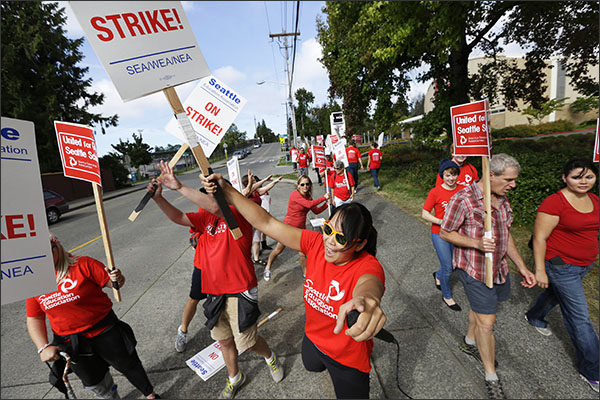Yesterday, former president of Starbucks International, Howard Behar, purchased a ![]() full-page ad in The Seattle Times to publish a letter expressing his displeasure with Seattle Mayor Ed Murray and the Seattle City Council for pursuing a slew of regulations that restrict how employers schedule and manage their employees.
full-page ad in The Seattle Times to publish a letter expressing his displeasure with Seattle Mayor Ed Murray and the Seattle City Council for pursuing a slew of regulations that restrict how employers schedule and manage their employees.
The regulations under consideration would require employers to give workers two or three weeks advance notice of scheduled shifts with extra pay for shifts with less notice, guarantee shifts are scheduled at least 11 hours apart, guarantee existing employees have the opportunity to work any extra hours before additional part-time employees are hired and mandate workers be paid a minimum of four hours for any shift.
Behar makes the point that regulations restricting how employers schedule workers will make it more difficult to hire part-time workers and workers with few skills, teens from underserved communities and minorities will suffer the greatest impact. In other words, the people who need those jobs the most.
Purchasing a full-page ad in the Sunday print of the Times is not cheap. And Howard Behar is by no means a conservative; in fact, he has a well-established resume´ on progressive causes and describes himself as a “pragmatic progressive.” Case in point, he ends his strongly worded letter by encouraging city officials to abandon their push for restrictive scheduling in favor of a policy he thinks is needed in the city—paid family leave. Hardly an issue embraced by conservative thinkers.
Behar’s willingness to dig deep into his own pockets to publish a letter publicly castigating city officials reflects a growing discontent amongst many of Seattle’s progressive business leaders with the city’s increasingly hostile stance towards employers. First came mandated paid sick leave, followed by restrictions on criminal background checks, a wage theft ordinance increasing penalties on employers who violate the city’s new labor law and giving workers greater power to sue those employers, and then the ground-breaking $15 minimum wage law.
Since then the city has considered not just the restrictions on scheduling, but also a new head tax on employers to fund labor union outreach to encourage workers to file labor complaints, commercial rent control and increases in business taxes.
In his full-page ad in the Times, Behar rails against the city’s increasingly heavy hand when it comes to how it treats businesses:
“Seattle’s city government sees business as nothing more than a necessary evil, focusing on a few bad actors and unfairly painting every employer with the same brush. In the punitive effort to punish the bad apples, Seattle has become an incubator for misguided labor policies that threaten employers, entrepreneurs and employees who want and are trying to do the right thing.”
“One of the city’s great business leaders recently stated that for the first time in his business life here he felt like he was being seen and treated as a criminal.”
Calling the mayor and members of the city council “hypocritical and out of touch,” Behar accuses them of acting “recklessly” as they craft policy that is clearly “political payback” to the labor unions who have funded their election campaigns:
“Our city government is becoming corrupted by the same forces [labor unions] and is pursuing an agenda to reward their own favorite special interests [labor unions].”
While retired and no longer speaking on behalf of Starbucks, Behar is delivering a message the company that is famous for its generous employee benefits likely thinks city officials need to hear. Despite offering these generous benefits to every employee that works at least 20 hours a week, Starbucks has found itself vilified as the poster child of abusive scheduling in this battle. But Starbucks says less than 3% of employee complaints are about scheduling. Considering the company employs over 235,000 workers, that isn’t bad.
Even the normally acquiescent Seattle Chamber of Commerce has expressed its growing irritation with the city’s seemingly never-ending business regulations. In a recent letter, the Chamber’s President and CEO sent a letter that encouraged members “to speak forcefully as a team” and declared “we need to do it now.” The letter warned the “one-size-fits-all, cookie-cutter approach” scheduling provisions under consideration by Seattle officials “will create more problems for employees.”





